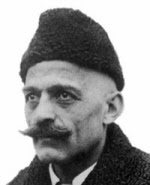
Vandaag: ... haalt met oorspronkelijk mijn boekenbon in huis:
'Drawing as a sacred actvitity', door Heather C. Williams, die onderwijs genoot op grondslag van de leer van de Armeens-Grieks-Russische mysticus en goeroe
Gurdjieff (wikipedia: 'his complete series of books is entitled "
All and Everything"; met naar eigen zeggen als doel: 'to assist the arising, in the mentation and in the feelings of the reader, of a veritable, non-fantastic representation not of that illusory world which he now perceives, but of the world existing in reality.')
Wikipedia: 'He asserted that people in their typical state were unconscious automatons [Cf.
Artaud; K], but that it was possible for a man to wake up and experience life more fully.'
De filosoof Jacob Needleman, schrijft in zijn studie
'G. I. Gurdjieff and His School':

"The Ray of Creation" in the teaching of Gurdjieff: The Absolute is the fundamental source of all creation. From the Absolute the process of cosmic creation branches and descends (involves) according to an ordered sequence of increasing complexity and density,
following the law of the octave [Cf.
'De compositie van de wereld' van Harry Mulisch; K]. The universe as a whole comprises countless such branchings from the Absolute.
Ray -> Regenboog: traditioneel zeven kleuren: do t/m ti? Denk ook aan de
zeven chakra's.

Eerder deze week een kaart van
mijn goede vriend met een schilderij van de Aborginal-kunstenares Emily Kame Kngwarreye. De vriend: 'Eens in de zoveel tijd zie je een meesterwerk. Gisteren zag ik het schilderij 'Merne / Everything V' van
Emily Kame Kngwarreye. Ik was een tijd van deze wereld, in een stilte die ik niet kende. Het was adembenemend mooi.'
Google afbeeldingen '
Emily Kame Kngwarreye'.
 Emily Kame Kngwarreye, 'Wild potato dreaming'.
Emily Kame Kngwarreye, 'Wild potato dreaming'.
http://www.diggins.com.au/represent_artist_image.asp?id=1241Born about 1910 at Alhalkare [meestal gespeld als 'Alhalkere'; K], a small soakage near Utopia, Emily experienced life before white settlement in the desert. In the late 1970s and 1980s Emily Kame Kngwarrey, along with other artists from Utopia, took up batik as a means of expressing traditional stories and designs and began painting on canvas in 1988/89. The radiant colour fields of dots layered across the canvas signify ‘merne’ or everything – the plants and flowers of her desert country.
Wandeling in het Vondelpark vanmiddag: prachtige patronen van 'in het harde zandpad geregende' gevallen bladeren en takjes. Deed me denken aan Jan Wolkers.
 Jan Wolkers: '2003.15'. Klik op het plaatje om het te vergroten.
Jan Wolkers: '2003.15'. Klik op het plaatje om het te vergroten.Op de terugweg van mijn wandeling Wil tegen het lijf gelopen, vlak bij m'n huis, na hem in jaren niet te zijn tegengekomen. Hij was allerhartelijkst, evenals zijn vriendin J.
Een prachtige dag.
 Emily Kame Kngwarreye, 'Merne (Everything)'. Geschilderd in 1996, het jaar waarin zij stierf op circa 86-jarige leeftijd. Klik op het plaatje om het te vergroten. De hoogte:breedte verhouding van dit werk (0,57) is overigens vrijwel exact die van de huidige breedbeeld-tv (9:16 of (3x3):(4x4) is 0,56) - het (alom)tegenwoordige venster van de massa op de wereld.
Emily Kame Kngwarreye, 'Merne (Everything)'. Geschilderd in 1996, het jaar waarin zij stierf op circa 86-jarige leeftijd. Klik op het plaatje om het te vergroten. De hoogte:breedte verhouding van dit werk (0,57) is overigens vrijwel exact die van de huidige breedbeeld-tv (9:16 of (3x3):(4x4) is 0,56) - het (alom)tegenwoordige venster van de massa op de wereld.
---
Wilde associatie: het gebied 'Alhalkere' -> droompaden -> de term 'Akashic field' van Ervin László (zie slot van de blognotitie
'Realistisch doemdenken').
(De letters van het woord 'Alhalkere' vormen in andere volgorde 'heelalark'. 'Emily created the
space of her country through the layers she placed on her canvases.' 'In later works (...) paintings were covered with multicoloured dots strung together like a
string of beads.' -
http://www.dreamweb.nl/emilyengels.htm.
Zie over Emily Kame Kngwarreye ook
deze aflevering van VPRO's Zomergasten met Tijs Goldschmidt, 22 augustus 2004. 'Elk schilderij is gemaakt onder gezang, het Verhaal van de Droomtijd. Als het lied uit was - en dat duurde vaak niet langer dan vijftien minuten -, was ook het schilderij klaar. Tijdens het schilderen worden de liederen gezongen die direct refereren aan de scheppingsverhalen van het stuk land dat geschilderd wordt.' De stippen die haar werk karakteriseren heten overigens 'i
dotsî')
http://en.wikipedia.org/wiki/Ervin_L%C3%A1szl%C3%B3[László's] 2004 book, Science and the Akashic Field: An Integral Theory of Everything posits a field of information as the substance of the cosmos. Using the Sanskrit and Vedic term for "space", Akasha, he calls this information field the "Akashic field" or "A-field". He posits that the "quantum vacuum" is the fundamental energy and information-carrying field that informs not just the current universe, but all universes past and present (collectively, the "Metaverse"). László describes how such an informational field can explain why our universe is so improbably fine-tuned as to form galaxies and conscious lifeforms; and why evolution is an informed, not random, process. He believes that the hypothesis solves several problems that emerge from quantum physics, especially nonlocality and quantum entanglement. He also sees his hypothesis as solving the perennial disputes between science and religion. [gedoeld wordt uiteraard op de kwestie van 'intelligent design' (zie hierover een stukje van de posting
'Snaartheoretische fantasie') versus 'darwinistische contingentie'; K]
-> waarbij zich een toeval voordoet, omdat
'the Metaverse' een sleutelbegrip is onder transhumanisten, zoals de maker van Transhumanar.
Wikipedia: "The term 'metaverse'
comes from
Neal Stephenson’s 1992 novel
Snow Crash, and is now widely used to describe the vision behind current work on fully immersive 3D virtual spaces. These are environments where humans interact (as
avatars) with each other (socially and economically) and with
software agents in a cyber space, that uses the metaphor of the real world, but without its physical limitations."
Zie ook de blognotitie
'Avatars en iconen' en de speculatie
'The Physical World as Virtual Reality'.

-> Ook doet de beschrijving van László's boek 'The Akashic Field' denken aan Jacob Needlemans omschrijving van Gurdjieffs 'Ray of creation' (zie hierboven). En aan de 'morphic fields' van Rupert Sheldrake. Maar deze gedachtensprongen zijn zo mogelijk nóg lukraker dan de andere in deze posting.
"
Rupert Sheldrake is best known for his theory of morphic fields and morphic resonance, which leads to a vision of a living, developing universe with its own inherent memory". [Associatie: 'inherent memory' -> 'voorouderlijke droompaden'].
Laatste toevoeging aan deze posting: de associatie met Sheldrake blijkt toch terecht in het kader van het denken van László zelf, getuige dit interview:
"...research indicates that there is instantaneous and spontaneous transmission of effect from one group of people to another, as if there were a kind of Internet in Nature. Rupert Sheldrake calls this the morphogenetic field and I call it the Psi-Field. It is essentially an information field."
Een uurtje terug (voor ik bovenstaande associaties had) struinde ik wat rond op de blog Transhumanar en las daar onder meer dit artikel:
 BBC on Everett - Parallel Worlds, Parallel Lives
BBC on Everett - Parallel Worlds, Parallel LivesIn 1957, the young and brilliant physicist Hugh Everett III published a paper which used some heavy duty mathematics to predict the existence of parallel universes. Although the concept of parallel universes seeped into popular culture, it was considered too way-out for mainstream physicists; and for many years, it remained in the scientific wilderness. Now, 50 years on, Hugh Everett’s son has travelled across America for a BBC Four documentary to find out more about his father’s theory, and why it has now been accepted by many physicists as the work of a scientific genius. Mark Oliver Everett’s own career path couldn’t have been more different from that of his father. Mark Everett is the creative force behind the successful American cult rock band Eels.











































